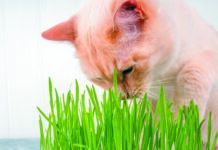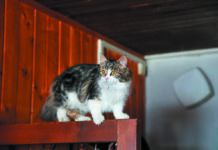Q. My cat has developed small black dots on his chin and around his mouth. They don’t seem to be bothering him, but I’m wondering if they’re something I should be concerned about. Can you let me know if I need to take any action?
Rosa York
New York, NY
Dear Ms. York,
A. It sounds like your cat has acne. The small black dots are dilated hair follicles, filled with oily secretions. The good news is that of all the things to stress about, feline acne is usually not one of them.
For most cats, acne is a pretty benign condition restricted to the chin area. All you need to do is clean the area — anywhere from once daily to two or three times a week, depending on the severity. Tufts veterinary dermatologist Ramón Almela, DVM, advises using benzoyl peroxide gel or shampoo with a concentration of
5 percent or less.
Some cats, however, develop complications as a result of their acne. The skin of the chin becomes inflamed, small pustules develop, and a bacterial or yeast infection may take hold. Such a situation requires a visit to the veterinarian, who may prescribe topical antibiotics in the form of creams or ointments or an anti-fungal treatment. (Yeast is a fungus.)
In such cases a vet may also recommend chlorhexidine-based shampoo or pads to help treat the infection and keep it from worsening. (Dr. Almela often recommends Douxo Chlorhexidine shampoos or pads, which can be found online.) An infection does not seem to be the case with your pet, as you are not describing pustules or scabs.
The cause of feline acne is not completely understood, by the way, although it clearly seems to involve the overproduction of sebum — an oily secretion of the sebaceous glands.
Cat drools when happy
Q. I have had a number of cats over the years, but my current one does something the others never did. He drools when I pet him — or even when he’s just kneading on my sweater. Is that normal?
Shonda Weber
Wayne, New Jersey
Dear Ms. Weber,
A. For a cat to drool when feeling content is perfectly normal and nothing to worry about. One theory about why it happens centers around endorphins — feel-good, opioid-like chemicals released in the brain when something that causes happiness is going on. Cats will often begin purring and drooling when they are given opioid drugs, say, right after an operation, so it may be that the body’s own natural “opioids” result in the same effect. It’s part of the body letting down during a state of contentment. Some cats even drool when they are asleep because they are so relaxed while slumbering.
Of course, stress or fear — like during a car ride to the vet’s office — can also cause a cat to drool. Other body processes come into play to make that drooling happen. It’s also nothing to worry about, other than to feel bad that a cat would be so stressed. The only time to worry about drooling is if there doesn’t seem to be much let-up and it’s not related to a mood, good or bad. Dental pain or other mouth pain, for instance, can cause a cat to drool excessively. Nausea, with or without vomiting, can cause drooling, too. Having something stuck in his mouth will also cause a cat to drool. Finally, licking or sucking on something toxic can lead to excess salivation. If your cat is doing a lot of drooling and it doesn’t seem clearly tied to a transient feeling of delight or fear, a veterinary visit is in order to get to the root of the problem.





I read your answer to Rosa York about her cat who was having feline acne on his chin and asked if it was something she should worry about. My cat had the same problem when he was younger and the vet told me to use only stainless steel bowls, and since then he’s never had a recurrence. Better than having to treat the chin with benzoyl peroxide over and over again. I was surprised that you didn’t mention it.